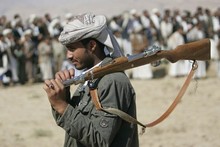 As Melanie Phillips says in her article for this week’s issue of the magazine, the case of Umar Farouk Abdulmutallab highlights the role of other, less frequently discussed, countries in Islamist terror. One such country is Yemen, where Abdulmutallab is thought to have trained at an Al Qaeda camp. The US believes there may be a few hundred al Qaeda fighters in Yemen, centered on a group of key network leaders who are operating a number of camps.
As Melanie Phillips says in her article for this week’s issue of the magazine, the case of Umar Farouk Abdulmutallab highlights the role of other, less frequently discussed, countries in Islamist terror. One such country is Yemen, where Abdulmutallab is thought to have trained at an Al Qaeda camp. The US believes there may be a few hundred al Qaeda fighters in Yemen, centered on a group of key network leaders who are operating a number of camps.
Yemen has slowly been getting more international attention. A few weeks ago I was meant to go on Al Jazeera, but my appearance was cancelled at the last minute because, I was told, of other “breaking news”. Curious, I turned on BBC and searched the internet to find out what the headline-grabbing story could be. Could it be the death of civilians in Helmand and Kandahar? Or a terrorist attack somewhere? No, the Doha-based news channel was leading on clashes between government troops and Shia fighters in northern Yemen, which have reportedly left dozens of people dead.
In Britain, the story received no coverage at all. But Al Jazeera probably called this one correctly. For Yemen is (or should be) international news. The Bin Laden family’s ancestral home may, after Somalia and Pakistan, become the next battleground in the struggle against extremism. Don’t be surprised if a future Tory government ends up having to think almost as much about Sanaa as Islamabad.
The Yemeni government is usually described as backing the US, but the truth is more complex and goes to the very heart of the problems we face with Islamism. Yemen’s political leadership of President Saleh, Sheikh Abdullah and the Keyse Soze-like General Muhsin have followed a delicate balancing act to maintain power, and sought to co-opt tribal factions by bringing them into government and involving them in the democratic process while expanding the triumvirate’s personal and familial control over state structures and resources.
President Saleh recruited Afghan veterans from across the Arab world in the civil war against northern Yemen. Many were absorbed into the army under General Ali Muhsin’s direction. This trend continued, after the civil war, with Bosnian and Chechen veterans – and, recently, Iraqi veterans, being integrated into the army. This has obviously created a number of tensions with the U.S.
When the U.S asked the Yemeni president to hand-over Sheikh Abd al-Majid al-Zindani, who figures on both UN and US terrorist lists, he refused. Sheikh Zindani was at the time Rector of al-Imam University, and Chairman of the Shura Council in Islah, the opposition party headed by Sheikh Abdullah. Cooperation has nonetheless continued, not only for counter-terrorism reasons but because of the important commercial links that exist between the U.S and Yemen. It was Hunt Oil, a Texan-based company, which originally discovered oil in Yemen, in 1984.
Until now it was assumed that the Yemeni leadership maintained sufficient control of the country to avoid attacks against western targets like the US embassy. And Yemen’s security apparatus have before been willing to act against lower-level Islamic extremists.
But this control may slowly be unravelling, as a fight against Shiite rebels intensifies and the flawed unification of the two separate Yemeni states in May 1990 comes under stress. In this new article, based on a recent research trip, analysts Alistair Harris and Michael Page investigate what is really going on in this troubled corner of the Middle East. Whatever the real facts are, expect to hear more from Yemen in 2010.






Comments